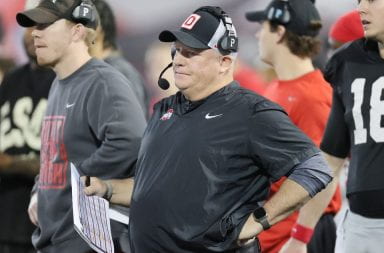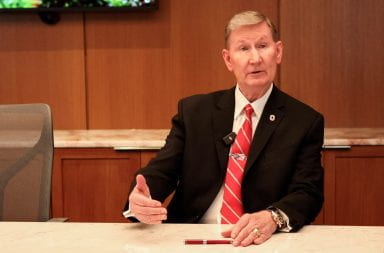Mitt Romney officially won the Iowa caucuses by the slimmest of margins Wednesday morning, beating candidate Rick Santorum by a mere eight votes.
This marked the closest result in the history of Republican presidential primaries and caucuses, according to multiple media sources.
Both Romney and Santorum took about 25 percent of the votes in the caucuses, and Ron Paul, who finished in third, took about 21 percent of the vote.
Jack Wright, a political science professor at Ohio State, said the Iowa Caucus is a poor indication of who will win the Republican nomination.
“Iowa caucuses have a tendency of last minute surges and Santorum certainly fits that mold,” Wright said.
While Romney, Santorum and Paul finished ahead of the other hopeful Republican candidates, the results in Iowa might have affected other candidates just as much.
Nathaniel Swigger, a professor of political science at OSU, said the burst from Santorum is what has basically pushed Michelle Bachmann and Rick Perry out of the race, and what could soon drive Newt Gingrich out.
“It’s entirely possible that Santorum plays a role in the next few contests similar to Mike Huckabee in 2008,” Swigger said. “In the end he probably doesn’t win the nomination, but he could certainly make things difficult for Romney, especially if he can pull off wins in South Carolina and Florida.”
Wednesday, Bachmann officially announced that she was suspending her presidential campaign.
Elliot Slotnick, a professor of political science at OSU, said that after the results were announced in Iowa, this was to be expected.
“I wasn’t surprised when she dropped out,” Slotnick said. “All her eggs were in one basket and that basket was Iowa, so when she didn’t win, it was sort of a given.”
Slotnick said Bachmann expected to do well in Iowa and was looking to the caucus to carry the rest of her campaign.
“I think she was riding on votes in Iowa, and when that didn’t happen, she sort of knew it was time,” Slotnick said. “It’s the state she grew up in and she is now representing a neighboring state, so she expected to do fairly well there.”
Despite a poor showing in Iowa, Perry announced from his Twitter account that he would be staying in the race for the nomination.
Swigger said the emergence of Santorum might have opened a small window of opportunity for candidate Jon Huntsman.
“(Huntsman’s) only path to the nomination involves opponents who can weaken Romney. If Santorum can play that role, then Huntsman may be able to put himself forward as a kind of compromise candidate,” Swigger said. “He’s still a longshot, but he’s in a better position now than he was a week ago.”
While the Republican campaign trails continue, and most move onto New Hampshire, incumbent candidate President Barack Obama spent the afternoon in Cleveland, Ohio.
Obama spoke at Shaker Heights High School on Wednesday to revive his efforts for boosting the economy. Although the speech was not a campaign for his reelection, it drew national attention.
“Folks here in Ohio and across the country — you’re the reason why I ran for this office in the first place. And on days like today, you remind me what we’re still fighting for,” Obama said Wednesday.
Many political analysts believe Ohio is a key state for either side in the 2012 presidential election.
“I know you’re hearing a lot of promises from a lot of politicians lately,” Obama said. “But today, you’re only going to hear one from me. As long as I have the privilege of serving as your president, I promise to do everything I can, every day, to make this country a place where hard work and responsibility mean something.”
Corrine McConnaughy, an assistant professor of political science at OSU, said despite surges from Santorum, Romney is still the front-runner.
“Despite winning by only a handful of votes, it’s pretty clear that Romney is still the front-runner,” McConnaughy said. “I expect him to win more comfortably in New Hampshire.”


